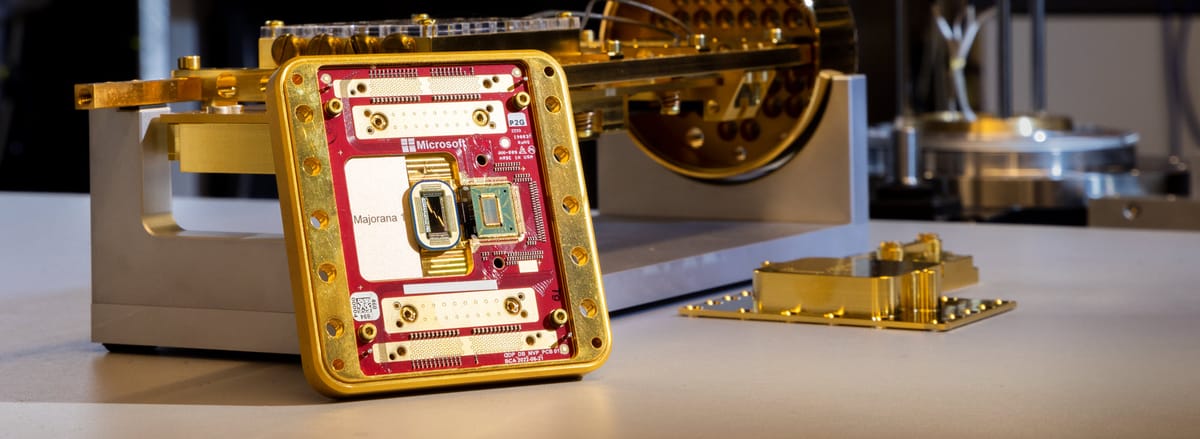Quantum computing just took another significant step forward. Microsoft has unveiled its highly anticipated quantum chip, and it’s more than just a technological breakthrough—it’s a signal to investors that the future is closer than we think.
For those tracking key innovations in tech and gearing their portfolios toward emerging industries, Microsoft’s entry into this space underscores the growing potential of quantum computing investments. Here’s a closer look at the new chip, what it means for the quantum landscape, and its implications for future-focused investors.
Why Microsoft’s Quantum Chip Matters
Microsoft’s new quantum chip is more than hardware; it’s the realization of years of rigorous research and engineering. While many players in the quantum computing race have made promises or demonstrated parts of the puzzle, Microsoft’s approach leverages its "full-stack" quantum effort, merging hardware, software, and cloud integration into a cohesive ecosystem.
Key Features of Microsoft’s Quantum Chip
- Scalability: Built to scale quantum computing capabilities, Microsoft's chip is designed to work seamlessly with Azure Quantum, the company’s quantum cloud platform. This integration gives enterprises and developers access to practical quantum solutions faster than other standalone systems.
- Stability and Error Reduction: One of the long-standing challenges in quantum computing is qubit stability (keeping qubits error-free for longer periods). Microsoft claims its chip significantly reduces errors, making it more feasible to execute meaningful computations.
- Topological Qubits: Microsoft’s unique approach uses topological qubits—distinct from the standard superconducting or trapped ion qubits. Topological qubits promise greater robustness and optimization for complex, real-world applications. This technological differentiation differentiates Microsoft from competitors like IBM, Google, and Rigetti.
These features suggest that Microsoft is not just building a quantum computer; it’s laying the groundwork for scalable commercial quantum computing—a paradigm shift for tech industries and enterprises worldwide.
Quantum Computing’s Market Potential
One figure stands out for investors: By 2030, the global quantum computing market is predicted to exceed $65 billion. With applications ranging from cryptography and pharmaceuticals to logistics and artificial intelligence, it’s clear that every major industry could be transformed by this technology.
Here’s how Microsoft’s quantum chip could expedite these opportunities for market growth:
- Boost Enterprise Adoption: By tying its quantum capabilities into Azure Quantum, Microsoft enables companies to experiment with quantum algorithms and gradually integrate quantum tools alongside classical systems.
- Attract New Partnerships: With a practical pathway to quantum computing, Microsoft’s chip will likely strengthen its partnerships with research institutions, governments, and corporations. Collaborations like these often yield exponential ripple effects in associated industries.
- Drive Innovation in AI and Machine Learning: Quantum computers excel at solving incredibly complex optimization problems, a critical aspect of advancing AI. Faster AI breakthroughs could enhance everything from predictive analytics to autonomous systems.
Gaining quantum capability positions enterprises for unparalleled efficiency and competitiveness. For investors, it provides an entry point into an industry with enormous upside potential.
What This Means for Investors
Microsoft’s quantum chip marks a shift from theoretical to actionable quantum computing, signaling both progress in the field and a pivot toward commercial viability. While quantum startups have been the primary beneficiaries of investment dollars until now, this development confirms that significant tech players see quantum computing as integral to the future of their business models.
Why Investors Should Pay Attention
- Long-Term Value: Quantum computing is not a short-term trend. Investments in quantum today could yield outsized returns as the industry matures. Microsoft is positioning itself early on to capture significant market share.
- Competitive Differentiation: Microsoft's use of topological qubits is a major differentiator from its rivals. If Microsoft’s approach works as intended, it could leapfrog existing competitors and establish market dominance.
- Ties to Cloud Leadership: Microsoft already dominates the cloud computing space with Azure. Its quantum chip further integrates into its cloud strategy, creating synergies between classical and quantum computing capabilities.
Diversifying Your Portfolio
Microsoft’s announcement also shines a spotlight on the broader quantum computing ecosystem. Beyond Microsoft, companies like IBM, Google, D-Wave, and IonQ are key players gaining attention. Similarly, quantum hardware components, next-gen materials, and quantum software startups represent viable areas for diversification in the tech sector.
Early investments in these supporting industries could yield complementary returns as quantum computing adoption accelerates.
What’s Next for Microsoft in Quantum?
Microsoft’s approach to quantum computing doesn’t stop at the chip. Its expansive vision includes tools to train developers and researchers, enabling quantum solutions to solve real-world problems. Expect developments in hybrid classical-quantum systems, further refinement of qubits, and ecosystem-wide integrations.
For investors, the company’s roadmap suggests steady innovation and commercialization efforts in a field primed for growth.
Final Thoughts
Microsoft’s new quantum chip is a watershed moment in the race toward quantum dominance. By integrating advanced hardware with its robust software and cloud infrastructure, Microsoft offers more than a product—it’s delivering a scalable platform that will define the future of computing for businesses worldwide.
For investors looking ahead, quantum computing offers a compelling opportunity to align portfolios with one of the 21st-century's most revolutionary industries. Staying informed and ready to act on developments like Microsoft’s quantum chip will be essential as the quantum era unfolds.


